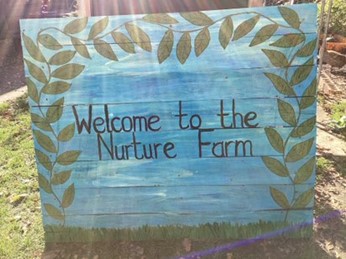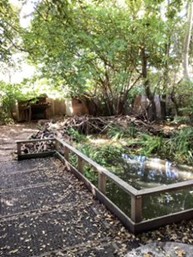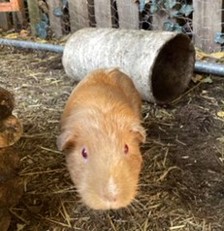
Context
Thomas A Becket Infant school is a much larger than average infant provision catering for children from year R to year 2 in Worthing. There are six classes per year group with 536 children currently on roll. The percentage of children with Special Educational Needs and Disabilities (SEND) is 9.2%. Children for whom the school is in receipt of Pupil Premium (PP) funding is 14% and 13% of pupils speak English as an additional language (EAL).
What example of good inclusive practice would you like to share?
The school has been building a programme of Outdoor Nurture Provision within the grounds and capacity of the school itself. The school has a longstanding history of Forest School provision for all children, however in recent years the remit has expanded to provide additional sessions for children with additional needs.
The programme of Outdoor Nurture Provision includes Forest School Clubs run both during the day and after school as part of provision for enhanced transition support as children prepare to move to junior school; The Nurture Farm which incorporates opportunities to care for animals and grow food to eat; Friday Sports Skills Club, run on Friday afternoon to support children who have become dysregulated by the end of the week.

What were you trying to achieve? Why? What was the intended outcome?
The intended outcome was to support children to understand and regulate their emotions in a safe and nurturing environment and to enable children to feel valued and successful and to celebrate their achievements. The freedom of Forest School enables the children to test their physical limits and demonstrate independence. This engagement with nature and the outdoors boosts cognitive development and leads to healthier, happier minds therefore promoting good mental health and well-being in the children.
What did you do, who was involved, when and where did it take place?
We raised the money from a charity supporting outdoor learning and then private funding from people who are passionate about supporting children through outdoor learning. The project has been ongoing over a number of years with different elements being planned and added in order to meet the needs and interests of changing cohorts of children. The development of the different strands of the provision has very much been a team effort. Many staff and families have been enthused by the programme and given time, energy and resources to ensure its success. We are always looking at different ways to fund the project in order to ensure its success in the future.
In pre-Covid times, the school had three therapy dogs who listened to children reading, however this was reduced to one dog post-pandemic. The Nurture Farm was begun in response to the reduction in opportunity for children to experience animals and the increase in children struggling to separate from parents and settle to learning as a result of the pandemic.

‘The Nurture Farm has been an invaluable resource in bringing the curriculum to life and providing more meaningful learning opportunities as the children learn by first-hand experience. It has enhanced the overall outdoor learning experience that we value very highly at TAB.’
Sarah-Jane Martin Forest School Teacher and Outdoor Learning Lead.

‘For some of our children, a visit to the Nurture Farm is a welcome distraction and can help them to feel grounded, relaxed and purposeful. For those children that have the job of taking care of the animals, it helps them to feel important and that they matter.’
Faith Goodyear year 2 teacher.
Mr. Ray, the school premises officer, who is also a qualified football coach, has started a Friday afternoon football club to support children who may be struggling to regulate by the end of the week and need some time outdoors to support general wellbeing as well as enhancing their gross motor skills.
What difference has the practice made to staff, children and young people?
The Nurture Farm has been invaluable in terms of the opportunities it has provided for staff well-being, it is a lovely place to be and staff often take their breaks there. Many children benefit from a morning visit to the Nurture Farm, several parents have commented on how this has helped with the morning transition from home to school. Forest school has provided a safe place for some children to have learning breaks when they have needed it. Having the time in nature has been proven by several research projects to reduce anxiety and stress levels. By having short or longer breaks in nature and forest school children have been able to calmly return to their learning within class.
How do you know? What data or indicators were used to support this?
‘The Nurture Farm in particular has reduced the number of incidents of dysregulated behaviour as children calm quickly and can regulate their emotions by being calm and kind to the animals. For some of our children, a timetable of regular learning breaks at the Nurture Farm has enabled them to remain in class for longer periods of learning time.’ Carole Thomson SENCo & Inclusion Manager. Through monitoring of behaviour incidents, we have been able to see a clear reduction of incidents and no exclusions.
What impact has the practice had on ‘every-day’, operational practice within the wider school?
‘The impact of the Friday Forest School Club is that it has had a positive impact on behaviour leading to a reduction in behaviour incidents and no exclusions, whilst giving them a positive experience of a learning environment. The high ratio of very experienced staff and small number of children in the group has enabled children to experience lighting fires, using saws and drills and a range of other outdoor activities. They are enabled to experience success and inclusion.’
Carole Thomson SENCo & Inclusion Manager.
What impact has the practice had on the school’s strategic development?
The Outdoor Nurture Provision within school has had a positive effect in terms of promoting and mirroring the school’s values of being ‘safe, respectful and ready to learn’. The different elements of the school’s Outdoor Nurture Provision mean that children feel safe and supported. Proactively planning for children’s needs to be met in an inclusive framework means that they spend more time in a regulated state and therefore the need to use de-escalation strategies is reduced. This has a positive impact on self-esteem and wellbeing.
What are the next steps for further development?
- Phase 2 of the Nurture Farm is to develop a ‘farm to fork’ programme by growing, cultivating and ultimately eating a range of different foods
- Phase 2 of Forest School Friday Club is to expand this from six children per group, morning and afternoon sessions, to twelve children with some children attending the group all day.
- To seek sponsorship from local businesses to enable further development and include a wider range of animals to take care of
What are your ‘top-tips’ for another school / setting that wants to follow a similar approach?
- Start small by doing one thing well and plan strategically from there
- No matter the size of your school, there are always opportunities to enhance the outside learning provision
- Encourage an open dialogue with all stakeholders to ensure that individual needs of children are understood and met
- Work in partnership with parent/carers, building relationships that lead to a better understanding of each child- this will help to unlock the potential of each individual
- Training for all staff on linking the curriculum to the outdoors, in order to provide real life experiences.
- Learning through Landscapes have provided training and online resources.
Links to West Sussex Inclusion Framework
Within Aspect 3: Personal Development, Well-being and Welfare
3.1 Social and emotional well-being and self-awareness
There is an open and supportive atmosphere that promotes self-awareness and allows children and young people (CYP) and staff to reflect on their own emotional needs and triggers.
CYP are given opportunities to share their feelings and emotions, and these are acted upon by the adults within school.
Staff at all levels understand CYP’s behaviour in context, in terms of communicating or attempting to address unmet needs. Staff understand their role in co-regulating and developing CYP’s capacity to become independent, regulate their emotions and manage their behaviours effectively.
Staff understand the link between emotional regulation and readiness to learn.
Strategies to support CYP’s social and emotional needs, including those derived from a therapeutic thinking approach, are embedded within the classroom and used consistently across the school. CYP see these tools and structures as useful and purposeful tools.
Aspect 3.2 Respecting each other
Positive relationships support all members of the school community and shared values are understood by all.
All children and young people (CYP) feel individually valued and known.
Systems and procedures for celebrating success are highlighted within the positive behaviour policy or equivalent, which is informed by a therapeutic approach and consistently used across the school.
Success, both in and out of school, is acknowledged and celebrated in a way that is supportive to CYP.
 Tools for Schools
Tools for Schools